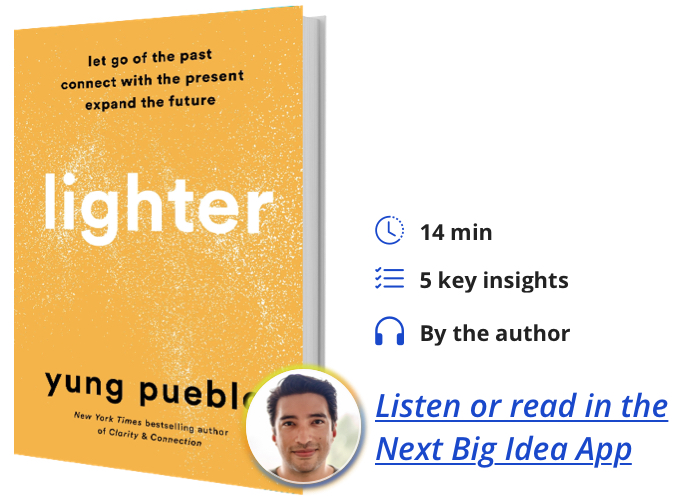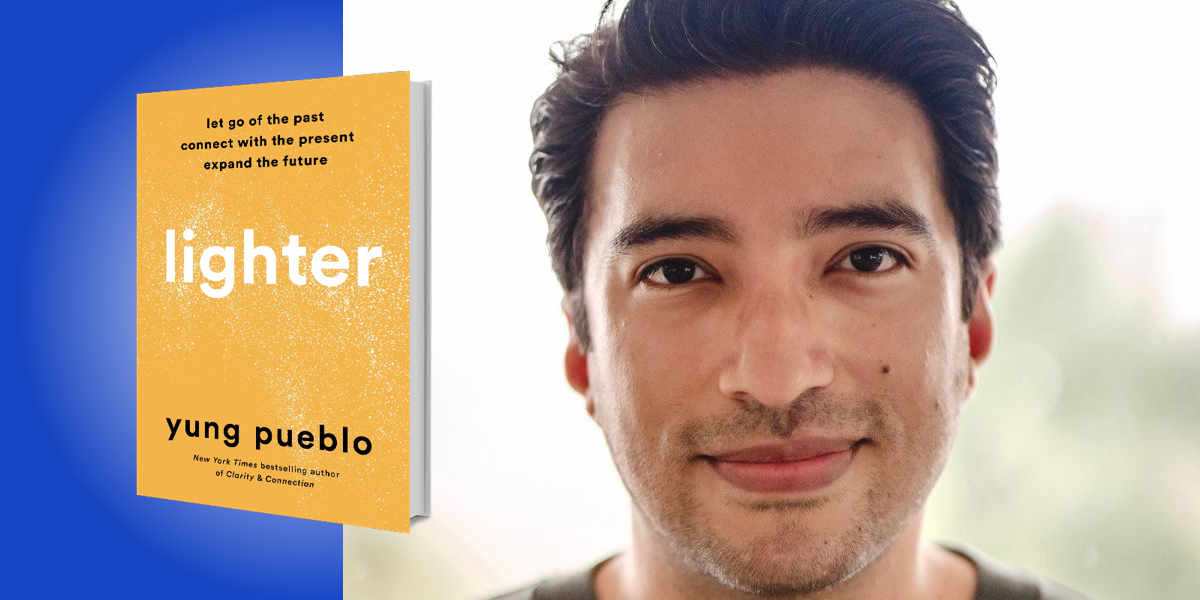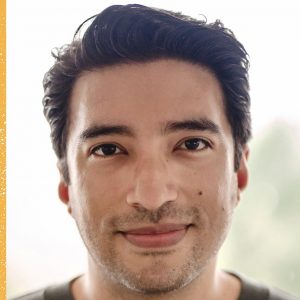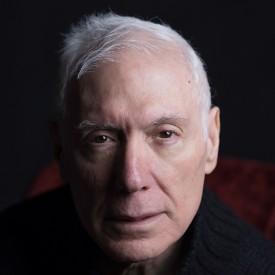Yung Pueblo is the pen name of the writer Diego Perez and means “young people.” Diego Perez is a meditator, writer, and speaker who is widely known on Instagram and various social media networks. His writing focuses on personal transformation, self-love and healing.
Below, Yung shares 5 key insights from his new book, Lighter: Let Go of the Past, Connect with the Present, and Expand the Future. Listen to the audio version—read by Yung himself—in the Next Big Idea App.

1. Self-love is transformative.
Real self-love is a tricky concept that requires a sense of balance to be able to use its transformative power—it is nourishing yourself deeply without becoming self-centered or egotistical. It is no longer seeing yourself as less than others, but at the same time maintaining the humility not to see yourself as better than others. The greatest benefits of self- love come from the positive interactions between you and yourself. Self-love is not only a mindset, but a set of actions.
Taken to its highest form, self-love is an energy we use to evolve. Ultimately, I define self-love as “doing what you need to do to know and heal yourself.” True self-love is multifaceted and includes radical honesty, positive habit building, and unconditional self- acceptance. These three pillars work internally and externally to generate and support an enduring sense of self-love.
Radical honesty, a form of authenticity that begins inside you, is a warm recognition that you gently apply to your conscious life. This view of radical honesty is not about telling everyone what you think. Instead, it is the root from which self-awareness grows. Thoughts and emotions that were once discarded or ignored are now embraced. Where you once felt the urge to run away, you now challenge yourself to face whatever is there. More than anything, any lie that you formerly told yourself is examined so that the truth may come forward. The key to radical honesty is that this is not about you and other people, but about how you relate to yourself in all situations, whether you are alone or with others.
Radical honesty leads to positive habit building. When we come to terms with the behaviors we have developed over time that limit our happiness and well-being, we realize that we need to intentionally build new habits. When we are honest with ourselves about what is not serving us, we can redirect our energy.
“True self-love is multifaceted and includes radical honesty, positive habit building, and unconditional self- acceptance.”
Self-love is a vehicle we use to travel through our own inner universe. What makes this journey productive is the self-acceptance we apply along the way. When we become open to self-discovery, our inner world will open up to us. Our history, which was once in the dark, will reveal itself under the light of self-awareness. The deep self-love that can make profound changes in our lives will turn us into explorers who bravely move inward to deepen our understanding of what makes us who we are. Without self-acceptance, any tough thing we come across would quickly stall or end our journey or have us running back to known territory. When we understand that we are bound to come across difficult things and arm ourselves with self- acceptance, we are more likely to embrace the hard parts of our conditioning and continue delving deeper into our emotional history.
2. Our relationship to impermanence defines our peace of mind.
The most common response to change is resistance. We wish to maintain our youth and crave flawless health. We want the people we love to never leave us. We wish pleasant moments and easy times would always remain. The human mind will even go as far as to ignore change so it can maintain the illusion of good things lasting forever. Our craving for pleasant things is sometimes so strong that we don’t even want to acknowledge that tough moments are happening.
Resisting the flow of change will cause you an immeasurable amount of struggle. It is like trying to move upstream against the clear flow of a river. You can spend countless hours pushing against change with no real success—change will always win. If you were simply to let go and allow yourself to move with the flow of nature, you would still encounter occasional challenges, but with less mental pressure. If you want to build harmony in yourself, you need to allow yourself to live in harmony with this fundamental law. Embracing change is the path to alleviating and eventually eradicating suffering. Change is the truth that binds together the arc of the universe.
If you spend too much time fearing change, you will forget to celebrate it. Everything within the universe of mind and matter exists because of the movement of change. Every conceivable level—from the atomic, to the molecular, to the mental and the conventional level where human beings interact with each other on a daily basis—is constantly in motion. This pervasive, ephemeral quality is ubiquitous, impacting reality, whether we are aware of it or not. Without the undercurrent of change, life itself would not be possible. The wisest and happiest people continuously immersed in the truth of change.
3. Find your practice.
The practice that is right for you will be something that you find challenging but not overwhelming. You have to locate your own sweet spot, where the practice is hard enough that it is helping you grow, but not so difficult that too many heavy patterns and old emotions are coming up all at once. These may cause you to feel overwhelmed and stop the process.
The key is to settle on a practice that meets your conditioning where it is. You will also know that a method is for you because you will feel that you aren’t wasting your time. The biggest sign is that your intuition will click and you will feel that this is something that you need to give your time to. Be wary of techniques that promise fast results or miraculous effects and say they will do all the inner work for you.
“The biggest sign is that your intuition will click and you will feel that this is something that you need to give your time to.”
Since each individual has their own conditioning, how one person heals is not how all people heal. This is one of the tricky aspects of doing introspective work. You have to find your own way by finding the right tool or technique for you. Luckily, you do not have to reinvent the wheel. Healing practices are abundant and becoming more accessible. What works for a friend or a family member may not be the right approach for you. It is important to take note of what feels right to you as you start your own personal journey because what you are doing should click with your intuition.
4. Healing is possible.
If you were to honestly examine your own life and mind, you would likely find something specific from your past that you could try to heal. At the very least, this reflection would help you see that you could be happier and that there is room to increase your inner peace and mental clarity. All human beings carry tension in the mind that inhibits them from living their best life. Fortunately, the tension that accumulates within us can also be released. Healing is when you intentionally decrease the tension you carry in your mind.
The human mind is commonly full of stress and anxiety. It does not do a good job focusing on the present moment and it is full of attachments that get in the way of living peacefully and making effective decisions. Honoring how our ups and downs have affected us deeply opens us up to learning how to live in a better way.
Left to its old patterns, our mind will continue its reactivity and keep us functioning on autopilot. What the mind knows best is repetition, which normally keeps us in a state of survival mode that defaults into blind behavior. This is especially true when difficult situations arise. Even when an emotion is hard on the body, like stress or anxiety, we will continue repeating it as we have in the past. Each reaction will even go as far as to slowly mold our perception, to the point where everything we perceive is first filtered through a thick layer of old conditioning, combined with our current emotions. Since our perception is being driven by our past and our emotions, it will inhibit our ability to recognize reality as it is. The mind will not do what is good for it unless we intentionally train it to do so.
Deep healing and emotional maturity begin when you turn your attention inward. The ability to see yourself as you move through the ups and downs of life, without running away or suppressing your feelings, enhances your understanding of yourself.
Feel your emotions as they come and go. Come to terms with your past and notice the way it shows up in your present. Watch your mind as it processes difficult situations. Take note of behavior patterns that show up repeatedly in your life. Examine your inner narrative and how your own thinking affects your emotions. Paying close attention to all these mental movements opens the door to the type of learning that can transform your life. None of these qualities of the mind occur on their own. They need to be intentionally activated and consistently cultivated to become strong enough to alter our mental health and shift us from surviving to thriving.
5. Internal changes ripple outward.
One of the biggest things we get from introspection is a greater sense of compassion for others that emerges from understanding how our own story has influenced our patterns. Even though you are one among billions, your thoughts, words, and actions create waves that are felt through the collective of humanity. The change in you is also a reflection of what many others are going through. This global burst in introspective work is not just happening within a few people; it is happening at a tremendous scale.
“The best thing you can do for the rest of us is to heal yourself.”
Jiddu Krishnamurti, a sage from the modern era, once said, “A change in one is a change in millions.”
Another sage, Lao Tzu, wrote: “If you want to awaken all of humanity, then awaken all of yourself. If you want to eliminate the suffering in the world, then eliminate all that is dark and negative in yourself. Truly, the greatest gift you have to give is that of your own self-transformation.” The harmony within one person cannot do it alone, but the harmony within many will cause an undeniably positive wave of change.
The best thing you can do for the rest of us is to heal yourself. This is the priority above all else. Keep in mind that you don’t need to be fully healed to be of service to the world. You can walk the inner journey and be a catalyst for change at the same time. As you move inward, your self-love will open the door to love for all beings, and that love will be active. You will be able to take action in a way that fits you well, plays to your strengths, and is in alignment with your talents and abilities.
Focusing on changing yourself is everything. When your mind becomes calmer, more aware, less tense, and better rested and nourished, your actions will become more skillful and a powerful creativity will emerge from your well-being. Life may become turbulent at times, but even if things get chaotic, do not abandon your healing. The wisdom you need to address the vicissitudes of life will emerge from the wellspring of your growth.
Sticking to your healing journey will keep you on the right track. Lifting yourself up and addressing the turmoil in your mind will directly lift up the rest of humanity. Trust in the simple fact that, if your mind becomes less tense, you will be decreasing the amount of harm that can enter the world through you. As you increase your peace, it will add to the total sum of peace in the world.
Making yourself an agent of healing will remove you as a potential point of harm in the interconnected web of humanity, and this is no small feat. It is actually one of the best things you can do for all of us. Removing your own potential to cause harm by filling your mind with love and learning to exist gently in our world is a deeply meritorious action. Living with a firm commitment not to cause other people harm will bring a bountiful stability to your mind.
To listen to the audio version read by author Yung Pueblo, download the Next Big Idea App today:
































